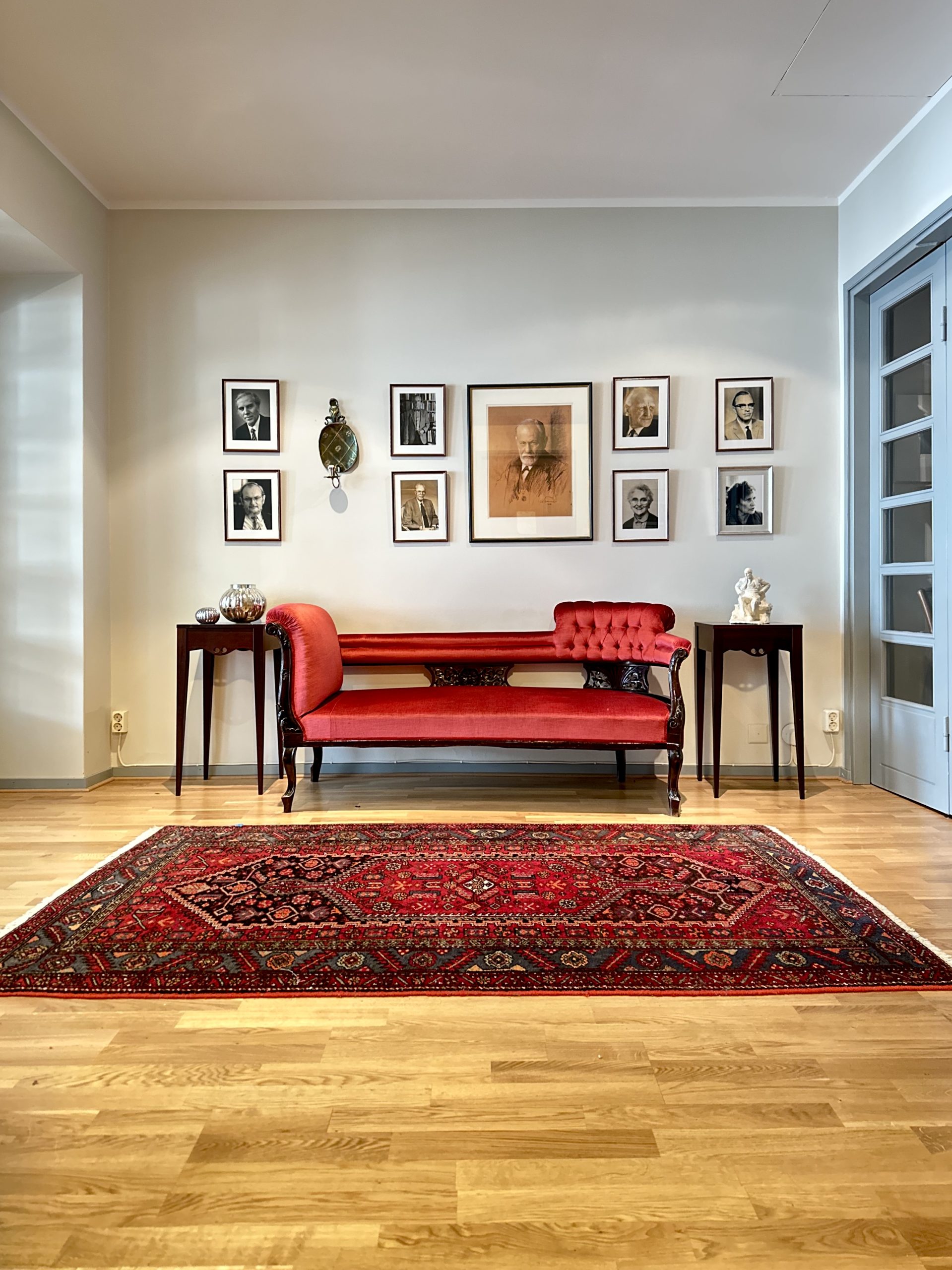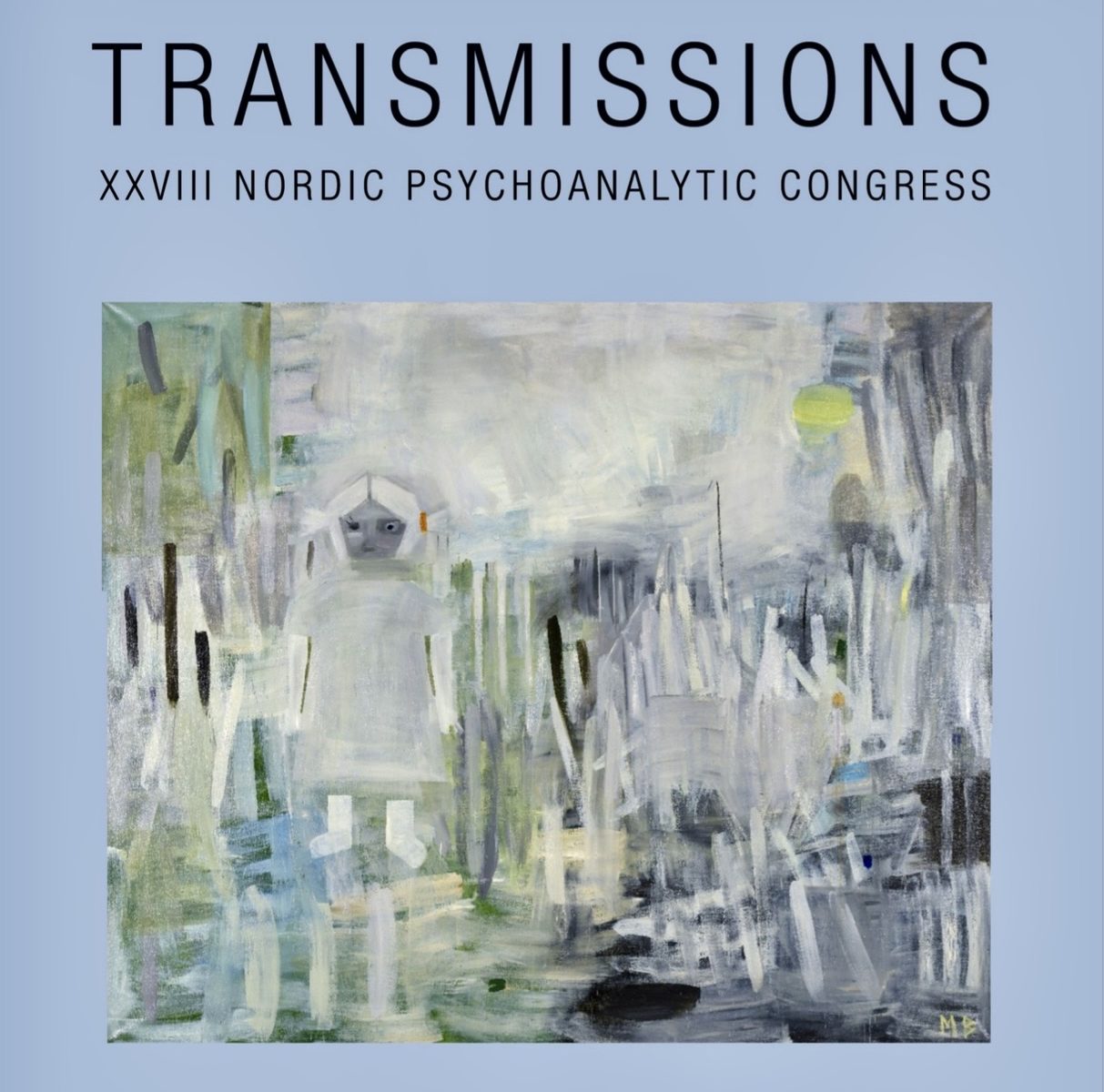8. – 11. AUGUST 2024
Pohjoismainen psykoanalyyttinen kongressi toteutuu tänä vuonna Oslossa 8.-11.8.2024 Norjan psykoanalyyttisen yhdistyksen järjestämänä aiheella Transmissions.
Kongressissa kuullaan Suomen Psykoanalyyttiselta Yhdistykseltä koulutuspsykoanalyytikko Ann-Mari Rytöhongan plenum-esitys ”When The Frame is Broken – A clinical illustration of the trauma caused by boundary violation”. SPY:n jäsenistä kongressiohjelmassa ovat lisäksi mukana Anneli Larmo, Eija Repo, Henrik Enckell, Pepita Hänninen, Pauliina Stjernvall ja Maria-Liisa Hannula.
INVITATION
”Dear colleagues!
We wish to welcome you to the XXVIII Nordic Psychoanalytic Congress in Oslo.
The theme for the congress is “Transmissions”. The term may have a foreign sound to psychoanalysts, still it resonates with phenomena and concepts that are central in psychoanalytic thinking.
With the theme ”Transmissions”, we want to focus on various psychic phenomena and processes that involve the transportation of often unconscious states/emotions and ideas/values between people and between the culture and the individual. From birth, we are all exposed to conscious and unconscious transmissions of emotions and messages that require psychic processing.
Freud was the first to articulate how the past, through transferences and countertransferences, becomes alive in the analytic relationship. Bion has in his later writings, described some forms of transmissions in the analytic relationship that he believes are not captured in interpretations of the transference and countertransference dynamics. He encourages us to listen ”without memory and desire” (Bion, 1967) as a way of becoming aware of mental processes at the edge of our consciousness, not least by giving space to fantasies and sensory impressions that arise in us during sessions.
In working with parents and infants, Fraiberg discovered how the parents’ own traumas manifested as ghosts from the past in the relationship with the infant. “The ghosts, we know, represents the repetition of the past in the present” (Fraiberg, 1975, p. 389). Specifically, there is clinical evidence that traumas that are silenced, and not reflected upon, can have a devasting effect on later generations. Psychoanalytic studies of the effects of the Holocaust provide a dramatic example of how often wordless “transgenerational transmissions” of unspeakable traumas can live on as silenced and destructive ghosts in subsequent generations. Laplanche’s theory (2015) on the enigmatic message also addresses the unconscious transmission from parent(s) to child(ren).
Transmissions from one generation to another also occur in psychoanalytic associations, both through concrete learning during training, but also in unconscious and unformulated ways in the association’s internal life. How do our associations deal with such processes? Today, teleanalysis and teletraining are practiced. The relational situation is transmitted through a screen and by sound, but without the physical presence of the participants. How do such transmissions affect the process? How are transference and countertransference dynamics affected when the interaction takes place over the Internet?
In art and literature, we can talk about the transmissions of inner states via a canvas, a sculpture, a film, or a novel. We can experience ourselves as both participants and spectators when encountering the work of art.”
The scientific committee: Kari Høydahl (chair), Fredrik Cappelen, Hanne-Sofie Johnsen Dahl, Cecilie Hillestad Hoff, Mette Hvalstad, Sølvi Kristiansen, Tonya Hall Madsen, Hanne Strømme, Kristin F. Wold
Administrative and social committee: Anne Kullebund, Henrik Kamphus Nilsen, Janne Kvien.
Cover illustration: Children of War (1999, the National Museum, Oslo) by the Norwegian painter Marianne Bratteli. Bratteli is one of Norway’s leading painters, and her latest exhibition in the Munch Museum (2023) was highlighted by the critics as unique and deeply moving. Her images express the basics of human life, memories, family relationships, loneliness, and darkness. Many thanks to Marianne Bratteli for allowing us to use the painting. Photo: Børre Høstland
Welcome to Oslo
The Norwegian Psychoanalytic Society wish to welcome you to the city of Oslo, a city at the intersection between mountainous forest areas and a pulsating shoreline. The city is a fast-growing Nordic metropole where the waterfront has seen many architecturally acclaimed areas, including cultural institutions such as the Opera house, the Munch Museum, the new public library Deichman Bjørvika, and the National Museum. The city also holds tradition and historical importance and has fostered great artists such as Henrik Ibsen, Edvard Munch, and Sigrid Undset. Oslo has also had huge gastronomically growth the last ten years and by 2023, the city has eleven restaurants with Michelin stars, while also keeping the manyfold cheap restaurants scattered around the east side of the city. We sincerely hope you will come and join us in Oslo city for the 28th Nordic Psychoanalytic Congress!
PROGRAMME
Thursday, 8 August
13.00-16.30 Clinical pre-congress in Child and Adolescent psychoanalysis (Location:TheHub)
13.00-14.30 Lecture by Hannah Holmqvist Mohammed: To look or not to look, that is the question – thoughts on early mother infant psychoanalytic work (further information in the map)
14.30-15.00 Coffee break/snack
15.00-16.30 Clinical supervision groups
12.30-15.45 Candidate meeting (Location: Fridtjof Nansen vei 17)
12.30-13.15 Lunch
13.15 – 14.00 Lecture by Hanne Strømme: Psychotherapeutic- competence development at post-graduate levels. What can findings from general training research tell psychoanalytic candidates?
14.15 – 15.45 Clinical supervision groups
16.30 – 18.30 Becoming a training analyst. Towards a Nordic
collaboration? For invited Board members. (Location: The Hub)
19.30 – 21.00 Reception in the City Hall of Oslo, Rådhusplassen 1
Friday, 9 August
9.00 – 9.30 Opening by the Norwegian Society’s President Mette Hvalstad and Chair of the Scientific Committee Kari Hoydahl
0.30 -10.30 Plenary lecture by Charlotta Björklind (Sweden). Transmitting thought and/or transmitting disease – a psychoanalytic exploration of similarities and differences between gaining insight and falling ill. Chair: Susanne Lunn
10.30-11.00 Break and coffee
11.00-12.00 Discussion groups. Conductors of group discussions: Gunilla Sallander, Anneli Larmo, Maria Fitger, and Henrik Kamphus Nilsen
12.00 -13.30 Lunch (Open 12.00-13.00)
13.30 – 15.00 Parallel lectures:
Björn Sahlberg (Sweden): Primary Identification as Transmission: On Borderline States and the Foreclosed Movement. Chair: Erik Stänicke
David Titelman (Sweden): Freuds judendom. Chair: Marie- Ange Wagtman
Eija Repo (Finland): Transmission of sexual and gender theories in psychoanalytic societies – How the Finnish Psychoanalytic Society ended up making a public apology to sexual and gender minorities. Chair: Mette Hvalstad
Tonya Hall Madsen (Norway): Transmissions of unspeakable loss – the impact of transgenerational trauma in the work with a psychotic teenager. Chair: Gunilla Sallander
Torberg Foss (Norway): Transmission in psychoanalytic training. Chair: Katrine Zeuthen
15.00 – 15.30 Break and coffee
15.30 – 17.00 Parallel lectures:
Pepita Hänninen (Finland): Awakening. “When the patient becomes aware of his transference state, of what then does he become aware?” Chair: Maria Fitger
Katrine Zeuthen (Denmark): Transmissions from three different levels of the unconscious in the analytic work with
Hanne Strømme (Norway): Transmissions in learning to deal with the transference. Chair: Bent Rosenbaum
Fredrik Cappelen (Norway): Transmissions and transformations of enjoyment and vitality.
Chair: Hannah Holmqvist Mohammad
Saturday, 10 August
09.00-10.00 Plenary Lecture by Ann-Mari Rytöhonka (Finland). When The Frame is Broken – A clinical illustration of the trauma caused by boundary violation. Chair: Sølvi Kristiansen
10.00-11.00 Discussion groups. Conductors of group discussions: Gunilla Sallander, Anneli Larmo, Maria Fitger, and Henrik Kamphus Nilsen
11.00-11.30 Coffee break
11.30-12.30 Plenary Lecture by Johan Berg (Denmark). Analyst and patient – transgressions, submissions, love and hate. Chair: Stephan Hau
12.30-14.00 Lunch (open 12.30-13.30)
14.00-15.00 Discussion groups. Conductors of group discussions: Gunilla Sallander, Anneli Larmo, Maria Fitger, and Henrik Kamphus Nilsen
15.00-15.30 Coffee break
15.30-17.00 Parallel lectures:
Stephan Hau (Sweden): The most important thing in communication is to hear what isn’t been said (Peter Drucker). Chair: Torberg Foss
Andrzej Webart (Sweden): ”Trans{m}issions” – Patienternas erfarenheter och upplevelser av övergångar i tid och rum mellan terapisessioner och vardagssysslor. Chair: Cecilie Hillestad Hoff
Pauliina Stjernvall (Finland): When language builds a wall, instead of a bridge; On the transmission of unrepresented mind. Chair: Kari Høydahl
Fredrika Stjärne (Sweden): An Incandescent Mind – a case presentation. Chair: Tonya Hall Madsen
Maria-Liisa Hannula (Finland): Transmissions of Shame: The Psychoanalytic Treatment of a Child with OCD. Chair: Fredrik Cappelen
Mette Hvalstad & Siri Erika Gullestad (Norway): Trans – transmission within psychoanalysis. Chair: Camilla Halvarson
18.30- Banquet dinner at The Hub
Sunday, 11 August
10.00-11.00 Plenary Lecture Erik Stänicke (Norway). Transference, transmission and transformation – some clinical and conceptual issues. Chair: Henrik Enckell
11.00-11.30 Coffee break
11.30-12.30 Research Award
12.30-13.00 Closing remarks
How to register
To register, please go to www.psykoanalyse.no/kongress/ Registration opens 10 April.
Cancellation policy, up to 15 May, no charge, between 16 May and 1 July 50 % of your cost, and after 2 July, no fee will be refunded.
Contact: Scientific Committee: Kari Høydahl kari.hoydahl@gmail.com Norwegian Psychoanalytic Society, e-mail: post@psykoanalyse.no


